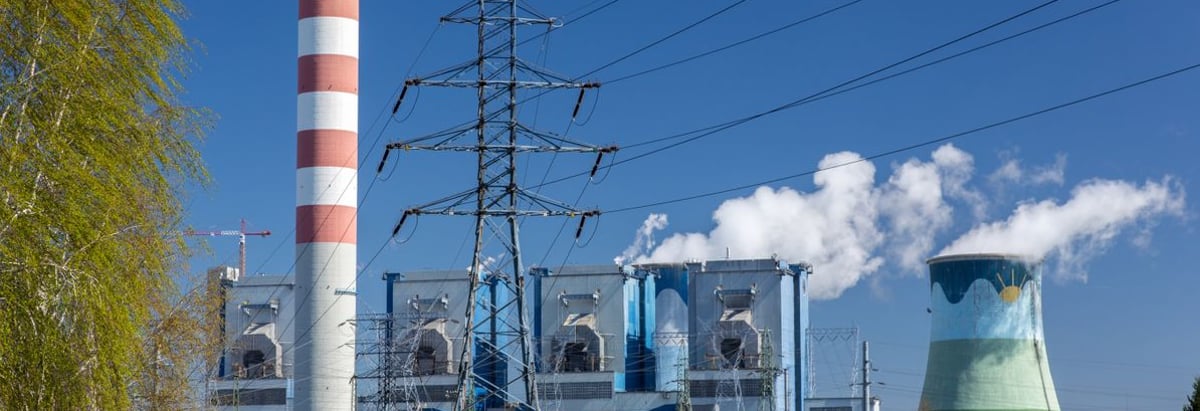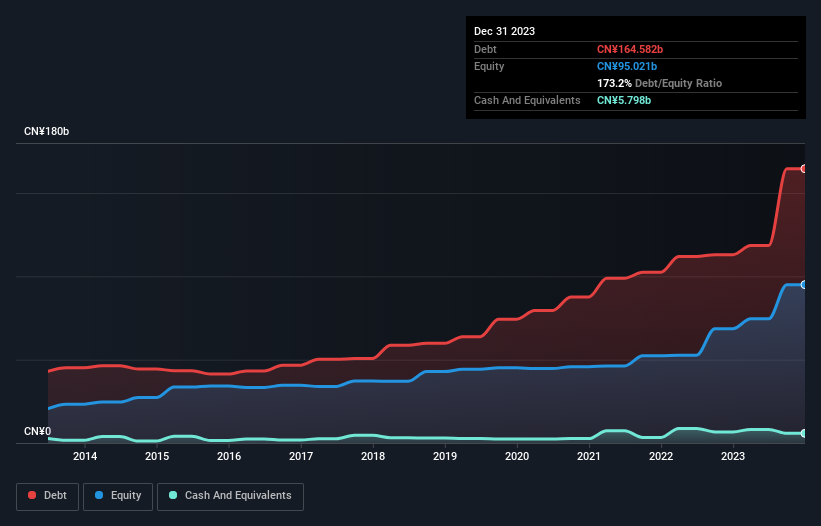- Hong Kong
- /
- Renewable Energy
- /
- SEHK:2380
Does China Power International Development (HKG:2380) Have A Healthy Balance Sheet?

Some say volatility, rather than debt, is the best way to think about risk as an investor, but Warren Buffett famously said that 'Volatility is far from synonymous with risk.' So it might be obvious that you need to consider debt, when you think about how risky any given stock is, because too much debt can sink a company. We note that China Power International Development Limited (HKG:2380) does have debt on its balance sheet. But should shareholders be worried about its use of debt?
When Is Debt A Problem?
Generally speaking, debt only becomes a real problem when a company can't easily pay it off, either by raising capital or with its own cash flow. Ultimately, if the company can't fulfill its legal obligations to repay debt, shareholders could walk away with nothing. However, a more frequent (but still costly) occurrence is where a company must issue shares at bargain-basement prices, permanently diluting shareholders, just to shore up its balance sheet. By replacing dilution, though, debt can be an extremely good tool for businesses that need capital to invest in growth at high rates of return. The first thing to do when considering how much debt a business uses is to look at its cash and debt together.
Check out our latest analysis for China Power International Development
What Is China Power International Development's Debt?
You can click the graphic below for the historical numbers, but it shows that as of December 2023 China Power International Development had CN¥164.6b of debt, an increase on CN¥113.0b, over one year. On the flip side, it has CN¥5.80b in cash leading to net debt of about CN¥158.8b.

How Strong Is China Power International Development's Balance Sheet?
The latest balance sheet data shows that China Power International Development had liabilities of CN¥75.2b due within a year, and liabilities of CN¥135.6b falling due after that. Offsetting these obligations, it had cash of CN¥5.80b as well as receivables valued at CN¥29.4b due within 12 months. So it has liabilities totalling CN¥175.6b more than its cash and near-term receivables, combined.
This deficit casts a shadow over the CN¥36.3b company, like a colossus towering over mere mortals. So we definitely think shareholders need to watch this one closely. After all, China Power International Development would likely require a major re-capitalisation if it had to pay its creditors today.
We measure a company's debt load relative to its earnings power by looking at its net debt divided by its earnings before interest, tax, depreciation, and amortization (EBITDA) and by calculating how easily its earnings before interest and tax (EBIT) cover its interest expense (interest cover). This way, we consider both the absolute quantum of the debt, as well as the interest rates paid on it.
China Power International Development shareholders face the double whammy of a high net debt to EBITDA ratio (8.7), and fairly weak interest coverage, since EBIT is just 2.3 times the interest expense. This means we'd consider it to have a heavy debt load. The good news is that China Power International Development grew its EBIT a smooth 58% over the last twelve months. Like the milk of human kindness that sort of growth increases resilience, making the company more capable of managing debt. The balance sheet is clearly the area to focus on when you are analysing debt. But ultimately the future profitability of the business will decide if China Power International Development can strengthen its balance sheet over time. So if you're focused on the future you can check out this free report showing analyst profit forecasts.
Finally, while the tax-man may adore accounting profits, lenders only accept cold hard cash. So we always check how much of that EBIT is translated into free cash flow. During the last three years, China Power International Development burned a lot of cash. While that may be a result of expenditure for growth, it does make the debt far more risky.
Our View
On the face of it, China Power International Development's conversion of EBIT to free cash flow left us tentative about the stock, and its level of total liabilities was no more enticing than the one empty restaurant on the busiest night of the year. But at least it's pretty decent at growing its EBIT; that's encouraging. Overall, it seems to us that China Power International Development's balance sheet is really quite a risk to the business. So we're almost as wary of this stock as a hungry kitten is about falling into its owner's fish pond: once bitten, twice shy, as they say. The balance sheet is clearly the area to focus on when you are analysing debt. However, not all investment risk resides within the balance sheet - far from it. Case in point: We've spotted 2 warning signs for China Power International Development you should be aware of, and 1 of them doesn't sit too well with us.
When all is said and done, sometimes its easier to focus on companies that don't even need debt. Readers can access a list of growth stocks with zero net debt 100% free, right now.
New: AI Stock Screener & Alerts
Our new AI Stock Screener scans the market every day to uncover opportunities.
• Dividend Powerhouses (3%+ Yield)
• Undervalued Small Caps with Insider Buying
• High growth Tech and AI Companies
Or build your own from over 50 metrics.
Have feedback on this article? Concerned about the content? Get in touch with us directly. Alternatively, email editorial-team (at) simplywallst.com.
This article by Simply Wall St is general in nature. We provide commentary based on historical data and analyst forecasts only using an unbiased methodology and our articles are not intended to be financial advice. It does not constitute a recommendation to buy or sell any stock, and does not take account of your objectives, or your financial situation. We aim to bring you long-term focused analysis driven by fundamental data. Note that our analysis may not factor in the latest price-sensitive company announcements or qualitative material. Simply Wall St has no position in any stocks mentioned.
About SEHK:2380
China Power International Development
An investment holding company, develops, constructs, owns, operates, and manages power plants in the People’s Republic of China and internationally.
Solid track record and good value.
Similar Companies
Market Insights
Community Narratives


